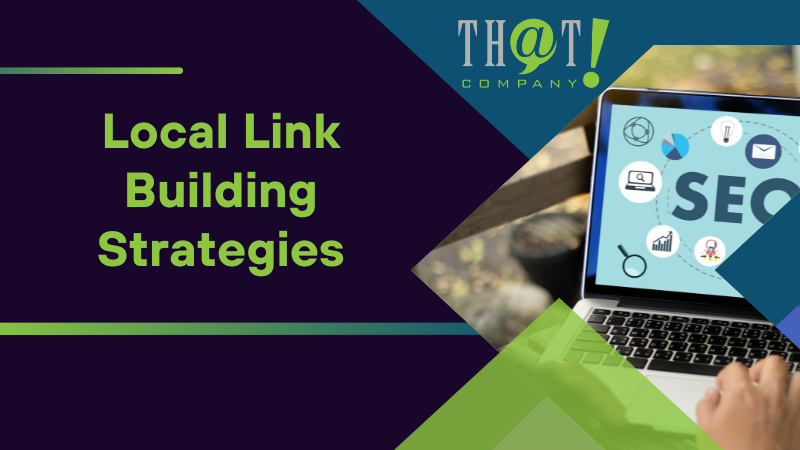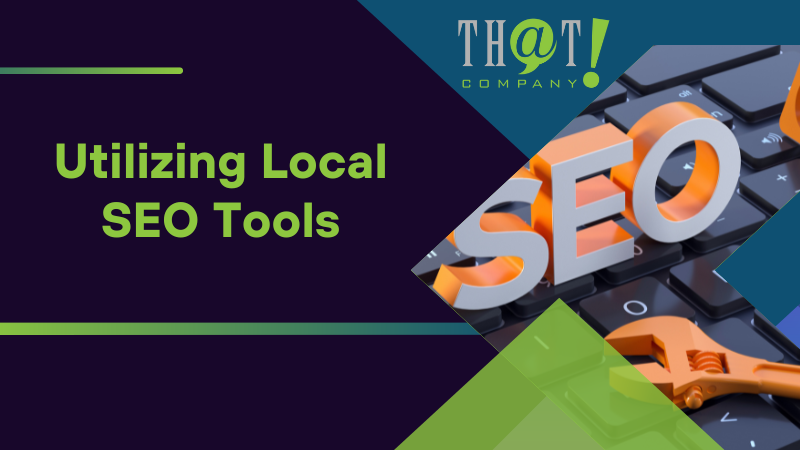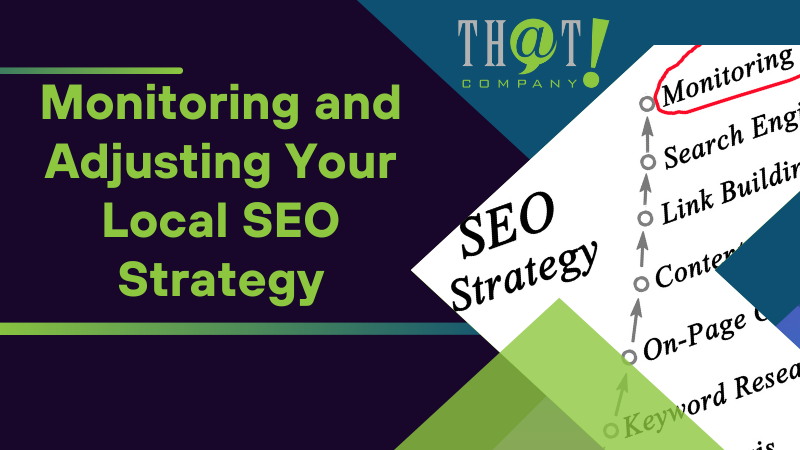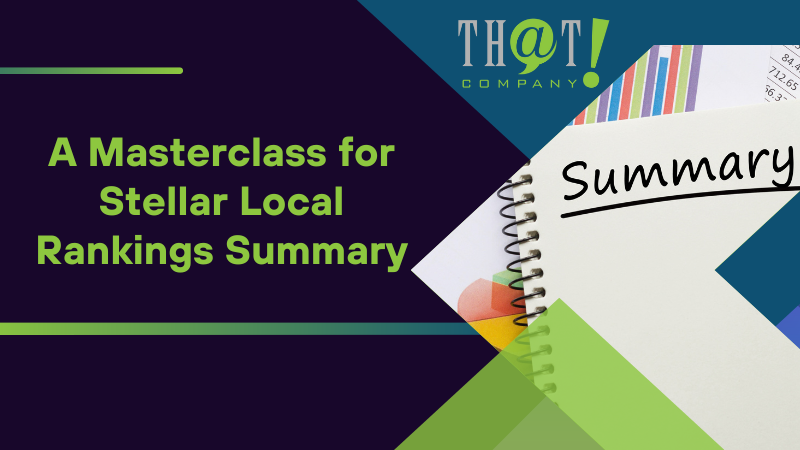
Climbing up the local search rankings requires a strong local SEO strategy, but where to start? Let’s cut through the complexity with direct, actionable advice. From Google profiles to keyword choices, we’ll guide you through the essential steps to enhance your local search visibility for business growth.
Key Takeaways
- A robust Local SEO strategy enables businesses to increase their online visibility specifically in their target geographic areas, attracting more local customers who are searching online for products and services.
- Consistent NAP (Name, Address, Phone) information and a well-optimized Google Business Profile are essential for improving local search visibility, boosting foot traffic, and ensuring the business is accurately represented online.
- Continuous optimization through local keyword research, encouraging online reviews, building relevant NAP citations, and utilizing local SEO tools are key to maintaining and improving local search rankings and visibility.

The Importance of Local SEO Strategy
In today’s digital era, Local SEO has become an indispensable tool for businesses. Improving search engine visibility is a key aspect of the process. This is particularly important for local businesses that have physical locations. The primary aim? To boost your online visibility in specific geographic areas and attract local customers. Imagine having a digital billboard that only people in your target area can see. That’s what a well-implemented local SEO strategy can do for your business.
Now, with over 75% of consumers turning to Google when looking for business information, having a robust Local SEO strategy is no longer a nice-to-have but a must-have. And, guess what? It’s not just about being seen. Local SEO strategies are critical for businesses to increase their online visibility and attract more local customers in the digital era.
Benefits of Local SEO
So, what’s in it for you? Well, Local SEO significantly boosts a business’s online visibility, directly translating to an increase in foot traffic to physical store locations. And here’s the exciting part: consumers are increasingly supporting local, independent businesses. This means that effective Local SEO strategies allow businesses to tap into this growing market segment.
But it doesn’t stop there. Local SEO also leads to:
- More efficient lead generation and sales, advancing overall conversion rates
- Targeting local customers who are already searching for your type of business, increasing the likelihood of converting them into paying customers
- Having a salesperson who never sleeps!
The Role of Google in Local SEO
When it comes to Local SEO, Google is the star of the show. Google Business Profile, for instance, is the top-ranking factor for ranking in the map pack. 36% of SEOs agree that the most important ranking factor for the map pack is Google Business Profile. This indicates a significant consensus within the SEO community. Claiming your business listing in Google is essential for ranking in local results. It is not just important, but super important..
But Google is not just about business listings. Engaging on social media and adding posts to Google My Business is considered more important than ever for Local SEO, impacting Local Pack rankings. So, if you’re serious about Local SEO, optimizing your Google Business Profile should be at the top of your to-do list.

Building a Solid Local SEO Foundation
Having a well-optimized website is the first step in building a solid Local SEO foundation. Key website optimization elements include location-specific keywords in title tags, URLs, and traditional on-page SEO components along with earning backlinks. Imagine your website as a house. The stronger the foundation, the higher you can build.
But it’s not just about optimizing your website. Internal linking within your site is also crucial. It aids Google in understanding your site structure, contributing to better local search result rankings. Think of it as a GPS for Google bots. The easier you make it for them to navigate your site, the more likely they are to reward you with higher rankings.
Additionally, utilizing tools like Google Search Console ensures that your site is crawlable and provides insights into how Google views your pages. Lastly, conducting a local SEO audit helps you see where your website currently stands and identify areas for improvement in your local SEO strategy.
Google Business Profile Optimization
One of the most effective ways to enhance your visibility in local search results is by claiming and optimizing your Google Business Profile. It’s a free listing that showcases vital business details such as location, services, and products to users on Google Maps and search results. But it’s not just about claiming your profile; optimization is key, and utilizing business directories can further improve your online presence.
A well-optimized Google Business Profile can lead to better search engine rankings and increase the number of calls and visits from potential customers. This involves keeping your profile updated with current hours, fresh reviews, and timely responses to customer feedback. Think of it as your virtual storefront. The more attractive and up-to-date it is, the more customers it will attract.
Consistent NAP (Name, Address, Phone) Information
Consistent NAP (Name, Address, Phone) information is another cornerstone of Local SEO. It builds reliability and accuracy of your business’s information across online platforms and directories. Inconsistent information can lead to confusion, negative reviews, and Google possibly not displaying your business in search results.
If you have multiple locations, details like store hours and unique descriptions should be included for Local SEO optimization. And remember, any changes in your NAP information should be promptly updated to maintain a positive online presence. It’s like having the same sign in front of all your physical locations.

Local Keyword Research and Optimization
Keyword research plays a fundamental role in SEO. For Local SEO, the focus is on identifying the keywords that people use to search for local products and services. Effective local keyword research can drive highly targeted local traffic to your site and increase the number of customers for your business. It’s like speaking your customers’ language.
The local aspect of keywords can include names of towns, states, counties, and communities where your business is operating. To identify specific local keywords, you should differentiate between core term, keyword modifier, and location to capture precise search queries. Plus, regular updates to your keyword list are essential to include new search terms and adapt to changing local search trends, making the most of local searches.
Identifying Local Keywords
How do you go about finding these local keywords? Is there a specific method you use? Tools like Google Autocomplete come in handy. It provides suggestions based on your initial input related to your business and location. But it’s not just about the most obvious keywords. Experimenting with different combinations of keywords relevant to your locale can generate an extensive list of Local SEO keywords.
Additionally, using tools like Ahrefs for competitor analysis can uncover keywords that your rivals are targeting in their Local SEO strategies. And don’t forget to track rankings for a variety of keywords, not just the most popular ones. After all, sometimes the less obvious keywords can bring in the most targeted traffic.
Optimizing Website Content
Once you have your local keywords, it’s time to optimize your website content. Incorporate local-focused keywords prominently in the website’s URL, title, and headers, particularly in the headline above the fold to aid local organic rankings. But it’s not just about stuffing your content with keywords. The content should match the local search intent by optimizing around Local SEO practices and considering the use of keyword modifiers for specificity.
Maintaining a blog that provides content centered around local interests, events, and issues can also attract backlinks and highlight your business’s local involvement. It’s like being a part of the local community’s conversation. Creating valuable local content on your website can establish your business’s local authority and attract the local community by featuring local industry info, employees, and educational resources.

Enhancing Local SEO with Reviews and Citations
Reviews and citations have become increasingly important in the world of Local SEO. They are considered a critical ranking factor for map pack rankings, which are a significant part of Local SEO. Think of it this way: the more positive reviews and accurate citations you have, the more trustworthy you appear to both Google and your potential customers.
But it’s not just about getting as many reviews and citations as possible. You need to manage the impact of online reviews on your Local SEO rankings by responding to all reviews, positive and negative, to demonstrate customer service and engagement.
Similarly, local business listings, which include mentions of your business’s name, address, and phone number, help increase online search visibility and trustworthiness when they are accurate and well-managed.
Encouraging Online Reviews
So, how do you get more positive reviews? Start by requesting reviews immediately after a purchase while the experience is still fresh. This can lead to more detailed and frequent positive feedback from customers. Physical signs with prompts to leave reviews on platforms like Google Maps placed in visible locations can serve as effective visual reminders for customers.
Automated follow-up emails with review platform links post-purchase also help to facilitate the process of leaving a review. And don’t forget to provide clear, step-by-step instructions to customers on how to leave reviews. This can significantly increase the number of reviews received. Utilizing automated review software tools such as Birdeye or Yext can simplify the task of sending review requests to customers efficiently.
Building NAP Citations
Building NAP citations is another crucial aspect of Local SEO. They refer to any mention of your business’s name, address, and phone number, and may also include your website. They account for 7% of the ranking algorithms in the local pack and local organic results, demonstrating their importance for Local SEO.
Building NAP citations presents a challenge that businesses must navigate. Inconsistent information can lead to confusion, negative reviews, and Google possibly not displaying your business in search results. So, it’s crucial to ensure your NAP information is accurate and consistent across all platforms and directories.

Local Link Building Strategies
Link building is a critical part of Local SEO. Links act as ‘votes’ from other websites, signaling to Google the legitimacy and authority of your site. The more high-quality local links you have, the higher your chances of ranking in local search results.
You can target backlinks that your competitors have by using tools such as Ahrefs Link Intersect and backlink checking features to acquire similar or better-quality links, thereby boosting your Local SEO. Additionally, backlink acquisition can be improved by reclaiming lost links, fixing broken links, and converting unlinked brand mentions by reaching out and requesting link inclusion.
Collaborating with Local Businesses
One of the most effective ways to build local links is by collaborating with local businesses. Backlinks from relevant local organizations like the Chamber of Commerce are important for improving Local SEO. It’s like getting a seal of approval from local authorities.
To obtain a backlink from the Chamber of Commerce, businesses may need to fulfill certain requirements, including membership and payment of fees. But the benefits of such collaboration far outweigh the costs. It not only provides high-quality local links but also opens doors for further partnerships and networking opportunities in the local community.
Participating in Local Events and Sponsorships
Participating in local events and sponsorships is another effective link-building strategy. Sponsoring local sports teams or hosting charity fundraisers can increase your local visibility and gain backlinks. It’s a win-win situation: you get high-quality local links and get to support your local community at the same time.
The key to successful event sponsorship or participation is relevance. Make sure the events or organizations you support align with your business values and resonate with your target audience. This not only improves your Local SEO but also strengthens your brand reputation in the local community.

Utilizing Local SEO Tools
In today’s digital landscape, there are various tools that can help businesses manage and optimize their Local SEO efforts. Semrush’s Listing Management, for instance, is an all-in-one local SEO tool that facilitates the management of online listings to improve local search rankings. Google Search Console is another crucial tool that helps monitor, maintain, and optimize a website’s visibility in search results.
These tools offer insights into search performance, user experience metrics, security issues, and important backlink data for search engines. They allow businesses to analyze competitors by filtering out branded keywords and sorting them based on keyword difficulty, aiding in local SEO strategy. Moreover, tools like WhiteSpark and Loganix can assist businesses in conducting an audit of their NAP citations to ensure accuracy across various platforms.
Google Search Console
Google Search Console is a free tool from Google that assists with monitoring a website’s SEO performance, diagnosing technical SEO issues, improving rankings, and managing the site’s online presence. It offers insights into search performance, user experience metrics, security issues, and important backlink data.
The tool enables webmasters to track things like organic traffic, keyword rankings, click-through rates, average positions, and traffic data. It’s important to verify site ownership and add a sitemap in Google Search Console to help Google bots crawl and index a website’s content effectively.
The Performance Report in Google Search Console provides detailed insights into a website’s search traffic and performance, including organic search results, for different queries and pages.
White Label Local SEO GEO Reporting Tool
The White Label Local SEO GEO Reporting Tool is another game-changer for agencies. It allows agencies to provide clients with visual representations of their local search rankings. The tool offers advanced visual GEO reporting to demonstrate to clients where they are ranked based on latitude and longitude.
The GEO Reporting Tool can generate map grids that show rankings within specified square miles, offering a clear picture of a business’s local SEO performance. The purpose of the White Label Local SEO GEO Reporting Tool is to help clients understand their rankings in specific geographic areas, which enhances the agency’s reputation and image.

Monitoring and Adjusting Your Local SEO Strategy
Just like any other marketing strategy, a local SEO campaign is not a set-it-and-forget-it type of deal. Consistent monitoring and adjusting of your Local SEO strategies are crucial for success. Google Search Console enables the monitoring of a website’s presence in search results and helps in optimizing that visibility.
But it’s not just about monitoring. To achieve the desired outcomes in Local SEO, continuous optimization of the strategy is necessary. This includes keeping an eye on your competitors, adjusting your keywords based on current trends, and constantly improving your website’s performance. Partnering with a provider offering professional local SEO services can help ensure these adjustments are made with expertise, keeping your strategy effective and competitive in an ever-changing digital landscape.
Tracking Local Rankings
Tracking local rankings is a critical part of monitoring your Local SEO strategy. Geo-grid map tools are essential in this process, providing a visual representation of a business’s performance across different areas. Tools like Local Falcon and Places Scout create local ranking reports with geo-grid map capabilities.
It’s important to adjust your local rank tracking settings to match the specific size and service reach of your business to get accurate results. With tools like Local Falcon, you can customize your local rank tracking grids to ensure precise analysis of your ranking performance in different locations.
Analyzing Performance Metrics
Analyzing performance metrics is another key aspect of monitoring and adjusting your Local SEO strategy. Monitoring key performance metrics is crucial in identifying areas of improvement and optimizing local SEO efforts.
Businesses should monitor the following metrics for actionable insights:
- ‘Online Presence’ score
- ‘Total Listings’
- ‘Listings to Fix’
- ‘Average Star Rating’
A competitive Local SEO strategy enhances a business’s understanding of the market by studying competitors’ practices. Analyzing competitors’ practices leads to discovering opportunities for improvement and gaining a competitive edge in Local SEO.

Summary
In summary, mastering Local SEO involves a multifaceted approach that includes optimizing your Google Business Profile, conducting local keyword research, encouraging online reviews, building NAP citations, and utilizing Local SEO tools. It’s all about making your business more visible to local customers and standing out in local search results. Remember, Local SEO is not a one-time effort but a continuous process of monitoring, analyzing, and adjusting your strategies. Partnering with a white label digital marketing company like That! Company can provide the expertise and support needed to implement these strategies effectively, ensuring sustained success. So go ahead, and take the first step towards boosting your local SEO today!

Frequently Asked Questions
What is the role of Google in Local SEO?
Google’s role in Local SEO is significant, primarily through its Google Business Profile and the engagement on social media and Google My Business, impacting Local Pack rankings. Businesses must utilize these platforms effectively.
How can I optimize my Google Business Profile for Local SEO?
To optimize your Google Business Profile for Local SEO, make sure your profile is complete, accurate, and up-to-date, and engage with all reviews to show good customer service.
What are some effective Local SEO strategies?
To improve your local SEO, focus on using location-specific keywords, building NAP citations, encouraging online reviews, and utilizing local SEO tools such as Google Search Console and White Label Local SEO GEO Reporting Tool. These strategies can help boost your visibility in local searches.
How can I track my local rankings?
You can track your local rankings by using geo-grid map tools like Local Falcon and Places Scout, which offer visual representations of your business’s performance across different areas. Try using these tools to monitor your local rankings effectively and adjust your strategies accordingly.
What are the benefits of using Local SEO tools?
Using Local SEO tools helps businesses manage and optimize their Local SEO efforts by providing insights into search performance, user experience, security issues, backlink data, competitor analysis, local keyword research, and NAP citation monitoring. This can lead to improved visibility and performance in local search results.



























 Talk With Us
Talk With Us  Give Some Love
Give Some Love 


